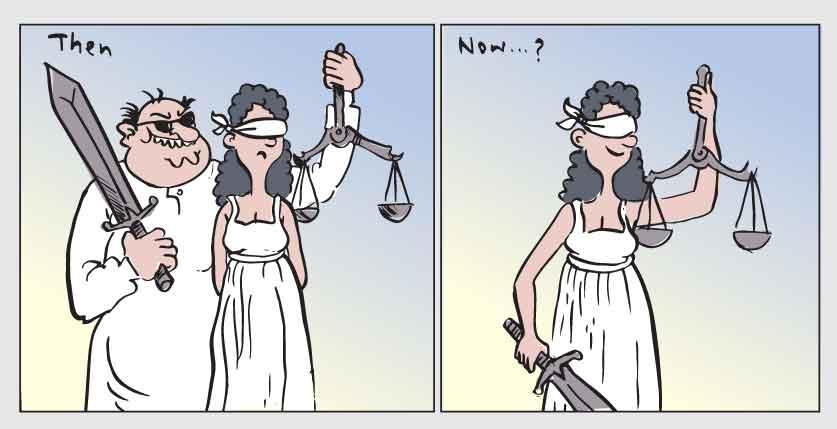26 Nov 2024 - {{hitsCtrl.values.hits}}

Delivering his first policy statement during the inaugural session of the new Parliament on November 21, President Anura Kumara Dissanayake stressed that nobody would henceforth be above the law. This, assurance of establishment of the rule of law in the country is a commendable statement which, if implemented would resolve almost all problems faced by the people except for the economic issues.
Sri Lanka is a country where impunity enjoyed by a particular group of people who wielded power at various levels has become the order of the day. We are a unique country where actions were taken to penalise those who sought redress from the judiciary for the injustices meted out to them while acquitting the accused of those legal actions. This is a country where a handful of individuals who were legally proved to have made the economy bankrupt ruining the lives of millions of people are at large, interestingly enjoying perks and privileges with the funds of the same victims of their actions.
This is also a country where the law enforcement authorities vouched before the judiciary that those who supplied wherewithal for a three-decade long bloody war were innocent and prevented legal actions against them, despite over a hundred thousand people having perished in that war. People who plundered public funds, for instance, by purchasing thousands of vials of a particular injection at an exorbitant price of Ra.40,000 each whereas the real price of it was only Rs. 250 are at large in this country. The impunity is such that no follow up actions were taken against those who sold state lands to individuals at an incredible price of Rs.370 per acre even after it was revealed before a Parliamentary committee.
Many factors make a mockery of the rule of law in Sri Lanka. Insufficiency of laws and regulations in par with the changing situations, law delays, lack of political will and interest on the part of politicians and officialdom and manipulation of law in order to gain financial and political mileage are some of them.
The insufficiency of law is said to be one of the major contributors to the tax evasion which in turn heavily contributed to the current economic crisis in the country. For instance, many appeal cases filed by possible tax evaders are said to be pending in courts for years, at a time when the government is facing a financial crisis. However, this has not been rectified for a long time owing to lack of interest and political will on the part of concerned people, despite it being well known to the authorities. On the other hand, law delays is also an issue unresolved for decades for reasons known only to the concerned politicians and officials, occasionally becoming a talking point.
The International Covenant on Civil and Political Rights (ICCPR) Act, No. 56 of 2007 is the best case in point for the manipulation of law by the authorities in Sri Lanka. The Act which is mainly meant to protect the rights of underprivileged and marginalised people has been used here to harass such communities and individuals such as writers.
A serious factor that makes the rule of law ineffective is the pressure on the judiciary by the executive for political reasons. When thugs associated with President J.R.Jayewardene’s United National Party (UNP) attacked the houses of Supreme Court judges in the eighties, the President justified it later. President Mahinda Rajapaksa ignored Supreme Court ruling on oil prices and he took steps to controversially impeach Chief Justice Shirani Bandaranayake. President Ranil Wickremesinghe, ignoring the Supreme Court rulings postponed local government election and he ignored the decisions of the Constitutional Council as well.
In Sri Lanka, even a bunch of uneducated parliamentarians can pass judgments on the conduct of a Supreme Court judge during an impeachment process against him/her, since allegations against such judges are investigated by a Parliamentary Select Committee (PSC). The majority members of the PSC consisting of ruling party gives leverage to the government in power to impeach apex court judges at will, if they have the two-thirds majority in Parliament. The fear in judges of this sword of Damocles hanging over their heads is a major issue that threatens the rule of law. Hence, the NPP government has to go a long way to establish the rule of law.
21 Dec 2024 21 Dec 2024
21 Dec 2024 21 Dec 2024
21 Dec 2024 21 Dec 2024
21 Dec 2024 21 Dec 2024
21 Dec 2024 21 Dec 2024